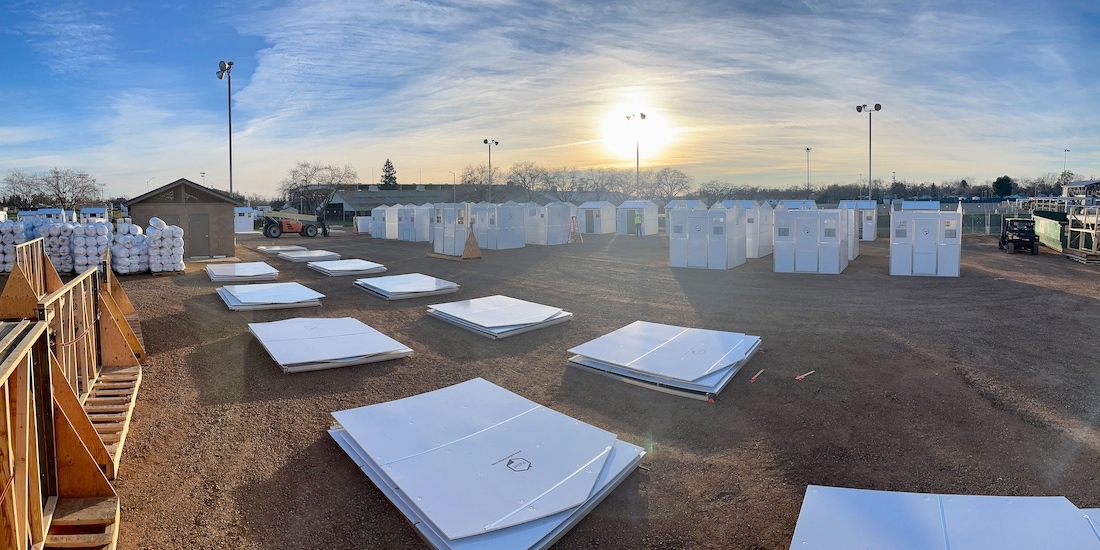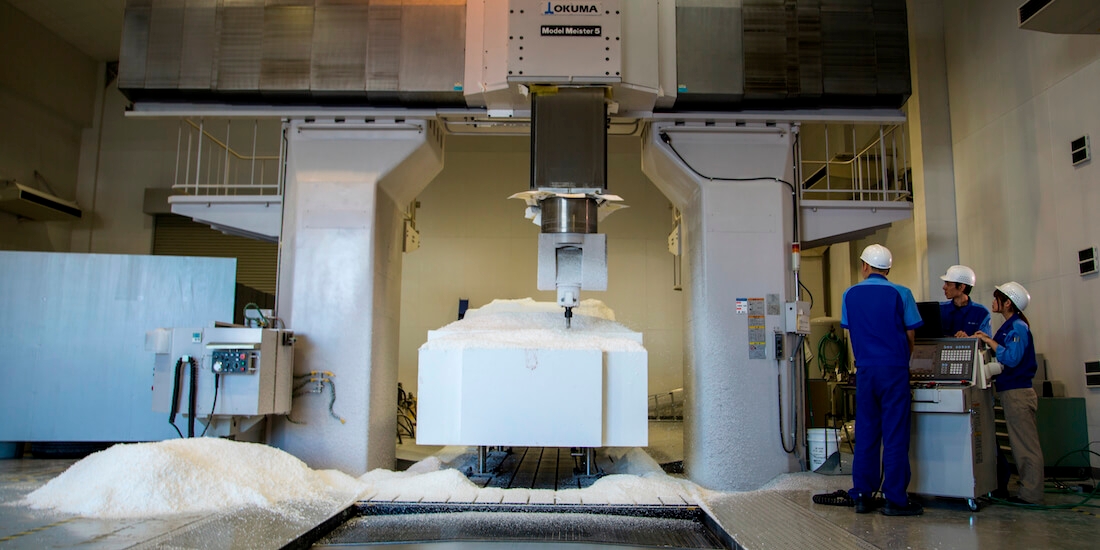Upskilling for sustainability helps equip a diverse workforce to lead the future
See how three organizations in the Autodesk Foundation’s portfolio are diversifying the US workforce by upskilling for sustainability—and why it’s crucial for the future success of the Design and Make industries.

Jen Ciraldo
May 28, 2024 • 13 min read
Design and Make industries are at a crossroads, with a looming labor shortage and a sharp increase in the use of advanced technology.
Across the United States, organizations have emerged that focus on upskilling people to have a digital-first mindset applicable to many emerging jobs.
Upskilling benefits not only workers but also the industries they’ll enter, making them more diverse and sustainable in the long run.
As emerging technologies create better ways of working and promise to push Design and Make industries toward a more sustainable era, a fundamental problem is plaguing companies: the labor shortage. It’s impossible to make progress without people. Behind the scenes, several organizations are working hard to train a new generation of workers. These organizations are committed to equipping a more diverse workforce and ensuring industries such as construction, manufacturing, and building automation keep pace with changing times.
Stacks+Joules boosts the next-gen workforce
September 4, 1882, was a turning point for building operations. Switches were flipped on the first buildings in New York City to have lights powered by electricity. Today, building operations account for 30% of the world’s energy consumption and are responsible for 27% of greenhouse gas emissions. In the next 40 years, the world is expected to add 230 billion square meters of buildings every month.
But with the rise of technology and the Internet of Things (IoT), building systems—such as HVAC, lighting, elevators, safety, security, and energy controls—can now be integrated and automated so buildings use only what they need. A workforce trained to operate smart buildings can help boost efficiency, eliminate waste, and reduce a building’s carbon footprint. But a large portion of today’s workforce is retiring without a new generation equipped for this new automated era.
“We talk about it in terms of going from keys to keyboard,” says Mike Conway, an educator and co-founder (along with technologist Jon Spooner) of Stacks+Joules, a New York–based nonprofit dedicated to filling the building-automation talent pipeline with the next generation of skilled workers. “We’re having these conversations with these operations teams, ‘What are these new competencies, these new tasks, that you’re having trouble finding someone to do?’ That’s where our opening comes in.”
Stacks+Joules designed a 14-week curriculum that equips people with a digital-first mindset and the fundamental knowledge they need to get started in modern operations. Students gain industry-recognized certification, instruction, and expert mentorship in building optimization and sustainability. The first project students are tasked with is coding a light show to the song of their choice, followed by HVAC fundamentals, and finally system integrations. “This is using software to build the simulations of the systems, which are then directly connected and form the basis of being able to control them digitally,” Conway says. “You can pull all of these systems together and then start to use that to optimize the performance of smart buildings.”
To support greater diversity in building automation, Stacks+Joules focuses on working with people who are often overlooked in this field. “Our mission, in a larger sense, is to give more people the chance to have careers that use technology for the common good,” Conway says. “We do that through work-based learning and getting placements into well-paying, promising future jobs.”
To find program candidates, Stacks+Joules partnered with Henry Street Settlement, a nonprofit dedicated to providing opportunities and social services to Lower East Side residents and other New Yorkers. “They are an incredible organization that’s been around for over 125 years, and they serve 50,000 people of all ages with a full range of support,” Conway says.
That’s where Ahmed Elnabaway first heard about the Stacks+Joules program. “Henry Street helped me out throughout a lot of situations,” Elnabaway says. “My very first job was with them. They also helped me out with building my résumé and interview skills.” When Elnabaway was 19, his coordinator at Henry Street turned him on to Stacks+Joules. “I think if I hadn’t enrolled in Stacks+Joules, I probably would’ve been undecided about what career I wanted to enter,“ he says. ”I probably wouldn’t have found so much interest in engineering.”
Now, Elnabaway is working in New York’s building automation industry and moving up quickly. Hired as a service technician, he's now a commissioning technician. And he’s enrolling in college, too. “I have a few careers that I’m aiming for,” he says. ”In the long run, I want to be either an architect, mechanical engineer, electrical engineer, or software engineer.”
Stacks+Joules partnered with the Autodesk Foundation to help students get more hands-on experience with digital twins and technology. “This project with the Autodesk Foundation is related to our DAB Lab initiative, which is Diversity and Automated Buildings Laboratory,” Conway says. “We’ve identified a building owned by Henry Street Settlement that has totally unconnected systems. There is one thermostat in the whole building. Everything else is on/off.” Stacks+Joules students will update building systems and create a digital twin to learn how to work with live data.
With each graduating class, Stacks+Joules is filling the building-automation talent pipeline with skilled people like Elnabaway, who is enjoying being a part of this next-gen workforce and the opportunities that lie ahead. “It feels great,” he says. “It’s very exciting, and I’m open to learning more.”

JARC creates opportunities with CNC and soft skills
Over the coming years, the manufacturing industry is projected to add 3.4 million jobs, 2 million of which will go unfilled due to a lack of workers trained in advanced manufacturing technology. In Rhode Island, where 8.5% of jobs are in manufacturing, many of the 1,500 manufacturers are small companies that lack the resources to train new workers.
“The problem is that folks were in their jobs for 40-plus years,” says Allori Fernandes, site director for Jane Addams Resource Corporation (JARC) Rhode Island, an organization created to solve this very problem. “When they retire, there is no one prepared to take their spot. There was no succession planning.” Like the original JARC program in Chicago, the Rhode Island chapter is committed to building a diverse talent pipeline for the local manufacturing industry.
“JARC’s mission is not only to provide careers for folks,” Fernandes says. “We are also a diverse, inclusive organization.” JARC’s efforts focus on creating opportunities for those who often don’t have access to them. “They are folks looking for an alternative learning experience, a quick job training program to get a career,” she continues. “When we say ‘underserved communities,’ we are talking about groups who have experienced systemic oppression based on race and gender: people of color, BIPOC communities, and women. We have one enrollee who is a 40-plus single mother looking to change her career. We also have the 18-year-old who just graduated from high school and isn’t sure what he wants to do with his life, but he is good with his hands, so he applied for JARC.”
JARC Rhode Island offers a manufacturing fundamentals course and a 20-week CNC course, both free of charge. The organization offers financial assistance for childcare, rent, utilities, and transportation to make sure all students have an equal opportunity to join the program. Students graduate with a National Institute for Metalworking Skills (NIMS) certification and are matched with well-paying jobs, thanks to JARC’s partnership with Polaris MEP, a nonprofit program dedicated to growing the manufacturing industry in Rhode Island.
And JARC is there every step of the way. “What’s different about JARC is we’re able to provide job training, but we’re also able to provide life skills around financial means, budgeting, and being confident in interviews for folks who haven’t had that exposure before,” Fernandes says. “We’re providing all of that along with the skills that they need to retain these jobs.”

“There’s still a lot that we’re learning, and there are gaps in the manufacturing field as far as having more women on the floors, more women of color, more people of color,” Fernandes says. “How can we dispel this myth that women aren’t good at math and that women don’t like science, and why are we still having that narrative? The impact is already being seen because out of 11 trainees in our program, five are women, and they’re killing it.”
Claudia is one of them. “This opportunity with JARC has meant everything to me,” she says. Claudia enrolled in JARC when she was trying to figure out her career path. “Basically, we’re looking at blueprints, writing a program for them, and using the machine with wax at first,” she says. “So you get hands-on experience with the machine after you write your program, and you actually run the program.” But JARC offers much more than equipment know-how—such as Soft Skill Fridays, which focus on job readiness, personal finance, money management, and public speaking.
As manufacturing continues to evolve, JARC’s curriculum will, as well. Their trainers are learning Autodesk Fusion to help prepare people for the digital transformation underway in the industry. “We’re looking to introduce additive manufacturing and robotics to our curriculum,” Fernandes says. “I would like to see our graduates having careers, moving up the ladder in manufacturing, and being a supervisor one day. But, also, we want to help make the manufacturing world more diverse and more inclusive.”
That includes people like Claudia, who was among JARC Rhode Island’s first class of graduates. She earned her NIMS certification and got a job at Lavigne Manufacturing, a company dedicated to automation, robotics, and the continual training of their team. “I feel excited to be embarking on a career where I'll be growing and constantly learning,” she says.

Revolution Workshop diversifies Chicago construction
In Chicago, construction jobs are expected to grow by 7% through 2026. But there is a 57% gap between labor demand and supply. And in such a diverse city, the construction workforce remains predominantly white and male. Chicago’s working-age population is 17% Black, but Black workers represent only 8% of trade professionals. And while Latino representation has grown in construction trades, it is mostly in lower-paying roles with little career advancement. But one organization is on a mission to take this narrative in a new direction.
Revolution Workshop is a Chicago-based nonprofit that provides construction job training, career resources, and life skills to support tomorrow’s workforce. “Our whole mission is to get folks from underserved communities, and I’ll be very clear—Black, brown, and women—and get them into the field of construction,” says Manny Rodriguez, founder and executive director of Revolution Workshop. “I grew up with a very similar lived experience as a lot of my folks. And people looked out for me. I worked in construction on and off while I was going to college. I got my degree and decided I really wanted to help people.”
Rodriguez was inspired to create a space to empower others. “We know the societal ills that are afflicting our underserved communities throughout the country and here in Chicago, as well—the violence and all the things that come as a symptom from the root cause of poverty,” he says. “The only way I think you can break that in a capitalist society is by providing real economic mobility and opportunity, and that’s what construction provides. These are family-sustaining career pathways.”
Revolution Workshop started in October of 2018 with four employees and 10 trainees. Today, the organization serves 200 people a year at two different sites in the city. The nonprofit has two tracks: a 12-week pre-apprenticeship program to give people the hands-on skills to work in the field in positions like carpenter, electrician, or laborer and the Construction Professional Pathways Program, a 14-week course focused on project management and the office side of construction.
In the field program, students learn everything from tools to math to construction skills. “They build a subfloor,” Rodriguez says. “Then they put walls on that subfloor. Then they put a roof and sheath it. And then we’re doing electrical, and then we’re doing plumbing.” The course ends with three weeks of real-world work experience. “We’ll take them on a community project—maybe there’s something here in the shop we need built—and we pay them $15 an hour,” he says.
The Construction Professional Pathways Program grew out of the Power Up Academy, which Revolution Workshop piloted with local electric service company ComEd. In the Professional Pathways Program, students start to dive into construction technology. “We’re giving folks the basics of [Autodesk] AutoCAD, the basics of project management, and then we’re placing them with engineering firms, general contractors, developers, and architecture firms in entry-level positions. We work with those firms to develop internal training tracks. It’s like an apprenticeship for the office side so that they can earn and learn on that side of the fence, too.”

Revolution Workshop is a workforce development organization, but it’s also a community. The organization hosts block parties and offers educational seminars, like entrepreneurship and home buying, to current students and alumni. A core foundation of the program is teaching the life skills needed to succeed, including financial literacy, executive functioning, and employability. Students learn everything from communication skills to creating a budget to writing a résumé.
“A lot of our folks may never have had a positive role model, somebody that’s going up and getting up to work in a traditional sense,” Rodriguez says, noting that he talks to students about the realities of this field. “There is a construction culture I have to prepare them for. I don’t openly support or place people in racist or sexist contractors, but will they experience some racism and sexism on the jobsite in the lifetime of their career? Absolutely.”
At the end of the course, students meet with employers, some of them Revolution Workshop graduates, to find a job. Employment coaches help guide them as they venture out into the workforce. “Union or nonunion, plumber, electrician, carpenter, whatever—that’s up to you,” Rodriguez says. “I’m going to give you all the information. I’m going to teach you how to listen to people giving biased opinions and how to pull what you need out of that conversation so that you can make the best decision. That’s what it’s all about: giving them agency, providing them the tools to have agency.”
Daisy Benitez, a former Revolution Workshop student now three years into her construction career, is grateful for the organization’s support and guidance. “When I was younger, I wanted to be an architect,” she says. “I was interested in working with my hands. I got introduced to Revolution Workshop, and it literally changed my life.”
The organization connected Benitez with an employer through which she’s worked on hospitals, schools, a casino, and now the Obama Presidential Library. Benitez recently bought her first home. And she’s aware that she’s helping to break the construction worker mold.
“I’ve seen more women in the construction field, but when I first started, I was the only one on the team, and it was intimidating,” Benitez says. “Are they going to think that I can’t do the things that they can do? I’m superproud of the women that are going into it. I’ve seen older women do it. They’re leading the crew. And hopefully, one day, I’ll be able to run a crew, too. I love Revolution Workshop. They really are here to help and change people’s lives.”
Student by student, Revolution Workshop is building a more diverse and highly skilled labor force in Chicago, even working to change policies around workforce equity. With the right training and technology, the organization is redefining what a successful construction career can be, especially for populations that have been excluded from careers in the industry. But more than that, they’re uplifting people.
As construction, manufacturing, and building operations shift into a digitally powered future, they’ll need a new workforce to take the reins. Stacks+Joules, JARC-RI, and Revolution Workshop are creating lifelong learning centers to empower tomorrow’s workers with skills, opportunities, and support to benefit them and the industries they serve into the future.

About the author

Jen Ciraldo
Jen Ciraldo is a media producer and writer. She creates content for magazines, film, companies, and museums. From building fireproof homes in California to technology that improves workplace culture, her work explores topics that impact how we live.

